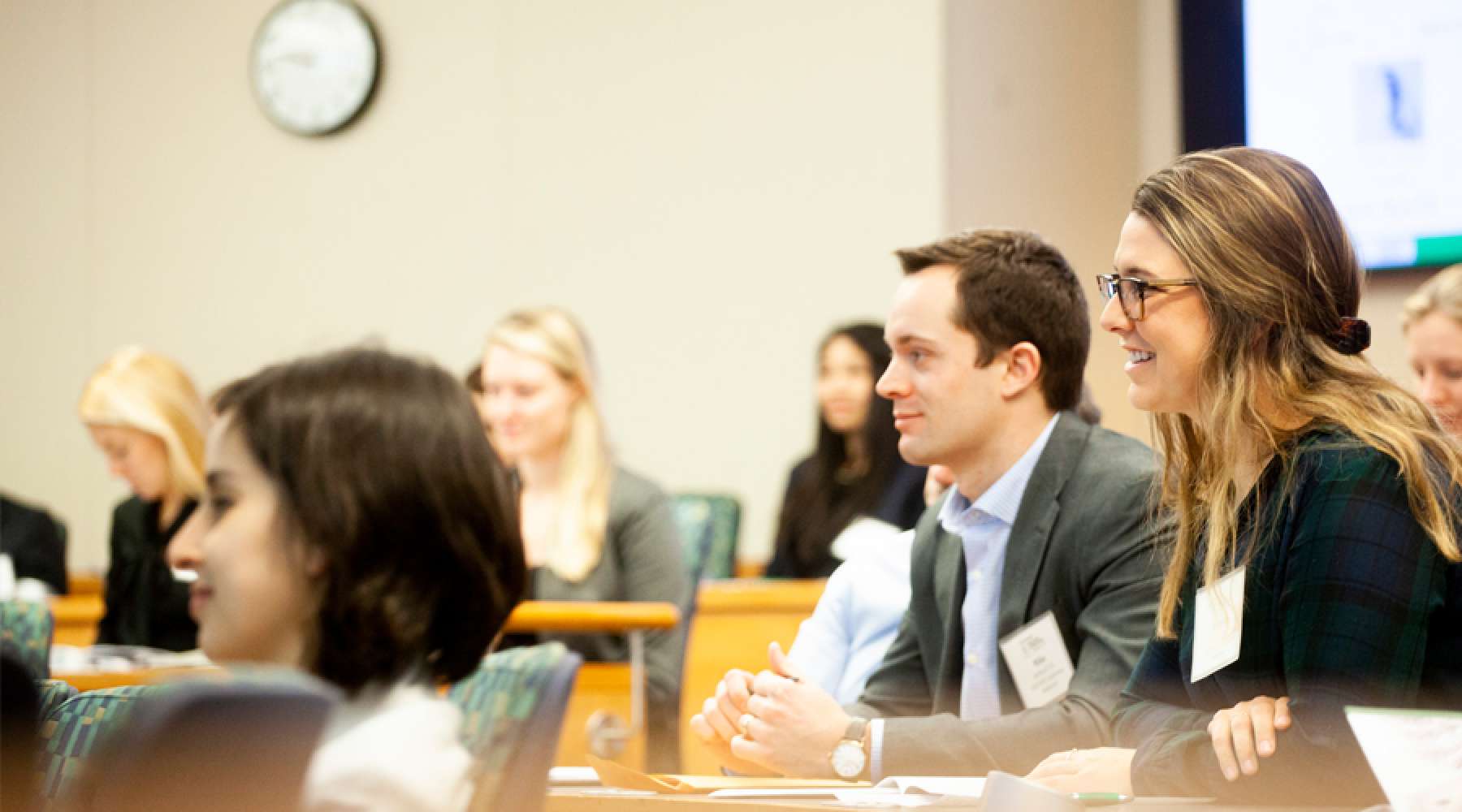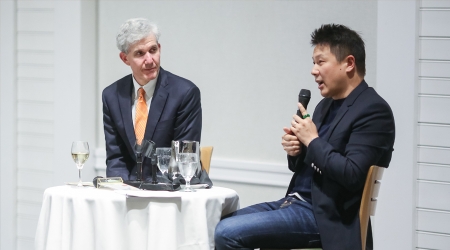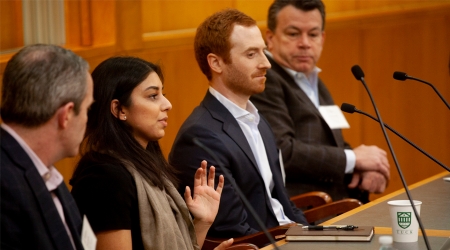
The 15th annual Tuck Private Equity & Venture Capital Conference took place February 6-7, 2020 and attracted a record-breaking 325 registered attendees including professionals, Tuck and Dartmouth alumni, students, faculty, and staff.
The conference began Thursday afternoon with a speed networking session between industry professionals and current Tuck students. Ten practitioners met with 30 students one-on-one for 10 minutes each to answer questions on the private equity and venture capital industries and offer career advice. Following this session was a pre-conference reception and dinner at the Hanover Inn for Conference speakers and other visiting professionals, Tuck faculty with research and/or teaching interests in the conference topics, and the student planning team featuring the first of three keynotes—Jie Lian T’01 in a fireside chat with Dean Matt Slaughter. Both events were a great way to kick off the conference!
Friday featured the main sessions of the PEVC conference. There were keynotes from Dwight Poler T’93 and Diane Daych T’85, who was interviewed by Martha Pease D’79, 10 topical panels moderated by current second year students, break out networking lunches between 11 industry professionals and small groups current students with 51 students participating. The conference concluded with a networking happy hour in the McLaughlin atrium of Raether Hall.
Below are highlights from our three keynote addresses and 10 topical panels moderated by students during the day on Friday. We hope you enjoy learning about the many interesting discussions that occurred throughout the conference and thank you again to all of our keynote presenters and panelists!

Thursday keynote: Jie Lian T’01 (Chairman & CEO, Perfect World Pictures) in fireside chat with Dean Matt Slaughter
Jie Lian T’01 shared what he has been up to since leaving Hanover and discussed the opportunity for investment presented by companies in China. After Tuck Jie spent almost 9 years with Goldman Sachs in their New York and then Hong Kong offices. Then, along with several former colleagues, he started Primavera Capital Group. Primavera is a China-based global private equity investment firm that focuses on retail/consumer, internet and technology, healthcare, and financial services. They started with a $1B fund and now manage around $5B. Jie highlighted the success of the BAT stocks (Baidu, Alibaba, and Tencent) as evidence of the opportunity within the Chinese market. Most recently, Jie became Chairman and CEO of Perfect World Pictures, a Chinese entertainment and film production company. Jie also noted that entertainment has always been his passion and it was inspiring to hear how he was able to achieve his goals.
Friday morning keynote: Dwight Poler T’93 (Senior Advisor, Bain Capital)
The key theme of Friday morning’s keynote was the increasing importance of socially responsible investing. Dwight Poler T’93, currently a Senior Advisor at Bain Capital, and formerly head of Bain Capital’s European buyout business, discussed how ESG investing is no longer just for dedicated funds, but something that all investors should be thinking about going forward. Dwight took us through the feedback loop of an investment and highlighted the positive influences generated by socially responsible investing.
Friday afternoon keynote: Diane Daych T’85 (Managing Partner & Co-Founder, Granite Growth) interviewed by Martha Pease D’79 (Independent Board Director)
The final keynote of the conference was a conversation between Diane Daych T’83 and Martha Pease D’79. The discussion focused on Diane’s decision to start Granite Growth Health Partners, a growth equity firm focused exclusively on health service companies. Diane shared how much she has enjoyed co-founding the firm with Mark Brooks D’88 and the important work her portfolio companies are doing in areas like outpatient addiction treatment and hospice care. She also spoke about her experience in private equity and often being the only woman in the room and discussed how important it is for everyone in the industry to bring more women onto boards.
 Panel Highlights
Panel HighlightsEnergy Private Equity: Investing in the Energy Transition
The key themes of this panel were impact and renewables. There was representation from both large and small funds investing in both conventional and renewable energy across developed and emerging markets. The panelists discussed how renewable energy can often qualify as impact investing, however LPs looking for a double bottom line is still in the minority. Regardless of whether energy investing is defined as impact or not, all see a huge opportunity to decarbonize emerging markets with 5 GW of diesel still running in Africa. Ten years ago coal was around 45% of installed capacity and today it is down to 20% due to money flowing into renewables and the panel is looking forward to further investment in the space.
Healthcare Innovation & Venture Environment: What’s Working and What’s Not
The group started the conversation by tackling the question, if you were to start a company in the healthcare space right now what general topic would be your focus? The discussion ranged from areas where AI can be used to augment current practice, to reducing the rates of c-sections and preterm births during pregnancy, to digital solutions around mental health, to food and nutrition solutions for disease prevention. During the panel the group also discussed the promise of telemedicine and innovation in the payor space. Although the panelists all cited how slowly the healthcare industry has traditionally moved, there was no shortage of exciting areas where the panelists see innovation happening.
Dual Perspectives: Former VCs Now Growing VC-backed Companies
Panelists shared a passion for company building and a desire to be close to the product as rationale for moving from VC to growing VC-backed companies. They enjoyed being intimately involved in the day-to-day operations of companies and being able to understand how organizations work beyond board discussions and numbers. As part of the discussion, panelists highlighted the importance of communication and relationships in getting them to where they are today. The Corporate Communications class at Tuck was even given a shout out! Finally, the panelists gave advice to current students that operating experience can help to build a deep level of expertise and perspective that are extremely valuable skillsets when looking for an investing role in the future.
Consumer Retail: Proliferation & Sustainability of Direct-to-Consumer Brands
The consumer retail panel was composed of a combination of CEOs of DTC growth stage companies and VCs. The first topic covered was the motivation for DTC distribution models. The CEOs on the panel highlighted complications with wholesale suppliers and early experimentation and success with pop up shops as their respective motivators, but both agreed that the common theme with all DTC brands is that the relationship with the consumer is everything. They acknowledged the drawbacks of their business model in terms of scaling but felt DTC is a powerful way to building a thriving retail company. Second, the panel covered Casper as a DTC case study. In regards to the high valuation achieved by the company, panelists noted that hindsight is 20/20 but it is easy to get swept up in a high valuation for an exciting company that was in the position Casper was pre-IPO.
Real Estate Investing in the Late Stages of a Boom Market
Longtime real estate and institutional investing professionals discussed the incredible growth in the real estate market over the past decade. They also explained how their approaches to investing in the late innings of the cycle have changed since a decade ago, what they learned from the last recession, and how recent trends in real estate, including companies like WeWork, are transforming the industry in the short and long term.
Buyouts: Using Industry Expertise in the Middle-Market
This panel focused on the various ways that industry expertise can benefit middle-market buyout firms. The discussion covered gaining access to deals by proving one’s expertise to bankers, gaining access to add on investments where there are often proprietary processes, and being able to add value to portfolio companies by having a deep understanding of the industry they play in. While firms highlighted the importance of having this expertise in house, they also acknowledged that they are not shy about using lawyers and consultants to gain additional insights that can benefit the firm during the due diligence process, or hiring MBA interns to help construct market maps.
Private Equity: Weathering the Storm During Recession
In this panel, discussion centered on growth in the PE industry during the longest bull market on record. With a likely downturn expected, panelists explored the implications across the industry and how GPs and LPs would prepare and approach the next correction. Challenges, risks, and opportunities that would emerge in a downturn were also debated as to how GPs and LPs would use downturn expectations to guide portfolio strategy, fundraising, and exits.
Sourcing Strategies in Buyouts & Growth Equity
The importance of sourcing strategies in a highly competitive environment was the focus of this panel made up of PE professionals with deep experience across the growth to buyout spectrum. Panelists explored how some firms think about sourcing as a key role in executing their strategy in addition to best practices and lessons learned. Advice for students on entering PE was also discussed.
Venture Capital: It’s Heating Up
The key topic of this panel was the sky high valuations received by many early stage companies in recent years. Panelists hypothesized that many traditionally later stage investors have been participating in earlier rounds as a method for capital deployment with the influx of large amounts of capital and more competition in the later stages Because interest rates have been low for so long now, they are seeking new ways to find alpha. As a result, the VCs on the panel highlighted the importance of staying disciplined when evaluating deals and being able to differentiate oneself from other investors in terms of the value add one will bring to the deal. However, the investors also acknowledged that a bad company is a bargain at no price and you can’t pay too much for a good company so many of them have participated in recent rounds with high valuations.
More than One Way to Make an Impact
In the last panel of the day, we heard from three different impact investors. Each approached impact investing with a slightly different angle. One panelist focused on adding value to female ventures in hard tech, another looked to create self-sustaining businesses, and the last focused on prioritizing stable incomes for companies over producing the maximum return. Although each investor had a slightly different focus, they all highlighted the value of focusing on different social return measurements rather than just financial returns. There is much debate on what exactly these measurements should be, but some examples brought during the panel were the percent of women or minorities working for the company and on the board, the number of jobs created as a result of the organization’s operations, and geography specific environmental measures.
The 15th annual PE & VC Conference was the most well attended yet and introduced two new opportunities for engagement between industry professionals and current students in the speed networking on Thursday afternoon and breakout lunch sessions on Friday. We are grateful for everyone who contributed to making this event such a success and we hope you will join us in Hanover next year for the 16th annual event!